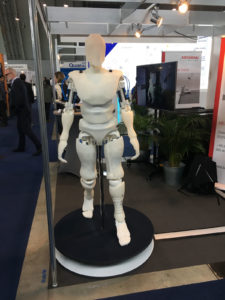The third edition of Autonomous Vehicle Technology Expo (May 21, 22, 23, 2019) literally buzzed with excitement – with a record number of attendees enjoying a wave of technology demonstrations and product launches from multiple exhibitors. Meanwhile, over 120 speakers took to the stage across three packed conferences to share their latest insights and innovations.
The show, which was once again held at the Stuttgart Messe, was the ideal location to forge new relationships, with representatives from Google, Daimler, Nvidia, Honda, Intel and Uber – to name just a few – able to share ideas and see and review the very latest software, sensors, mapping, data capture, testing, and simulation and validation equipment required for AV development.
Established names such as AVL List GmbH, dSPACE GmbH, Siemens and Xenomatix were joined on the show floor by a fresh wave of exciting startups and first-time exhibitors such as Realtime Robotics, In-Driving Technology China, and Artisense. The event’s new location for 2019 in Hall 6 – immediately adjacent to Automotive Testing Expo, the world’s largest vehicle test and development technologies exhibition, in Halls 8 and 10 – ensured convenient access to countless more AV and ADAS validation system and service providers, including familiar names such as Millbrook, Mahle, and Rohde & Schwarz.
Technology launches
The event saw a barrage of brand-new, cutting-edge technology for the testing and development of AV and ADAS systems, ranging from simulation and AI applications to lidar sensors, development vehicles, and proving ground equipment. From AB Dynamics’ Ground Traffic Control (GTC) system, which links all the assets on a proving ground to ensure safety and repeatability of procedures, through to StreetDrone’s latest AV development platform – an all-electric Nissan 7-seater e-NV200 – visitors were able to discover a diverse range of potential solutions and partners – and all under one roof.

Further debuts included Messring’s dynamic ‘ASTERO’ (Active Safety Test Robot), designed to more accurately replicate the motions of real pedestrians; Aimsun’s latest software platform for large-scale design and validation of path planning algorithms for self-driving vehicles, Aimsun Auto; and the announcement by Konrad and VI-Grade of a partnership to bring together their respective DIL and sensor fusion capabilities.
Over at Automotive Testing Expo, where dozens more products were showcased, Cruden demonstrated how DIL simulators can be added to existing automotive test environments and toolchains – particularly for the development and validation of ADAS and autonomous drive controllers. Applus+ IDIADA shared details of its forthcoming new CAV test tracks, and Millbrook announced it was adding a new, secure AV/ADAS test facility with the equipment required for performing all Euro NCAP 2020 testing and a wide range of non-standard CAV and ADAS test scenarios.
Shared insights
The event’s three dedicated conferences – Autonomous Vehicle Interior Design & Technology Symposium, Autonomous Vehicle Test & Development Symposium, and the Autonomous Vehicle Software Symposium – provided delegates, who were able to move between all three, with a combined program of more than 120 speakers, from thought leaders such as Uber, Cisco, IBM, Nvidia, Renault and Daimler.
The opening keynote at the Autonomous Test & Development Symposium saw Amir Shah, senior systems engineer at Uber ATG, reveal the ridesharing giant’s test-driven AV development, while emphasizing the need for greater collaboration: “No one company can say, ‘yes, I’ve done it’,” he said. “There needs to be some sort of collaboration between our private industry, government industry, etc. We’re really looking forward to that. And that is where we think that conferences like this can really help.”

The Software & AI Symposium was kicked off by Gabriel Sallah, EMEA HPC and big data architect for Microsoft, who discussed the importance of the cloud and cloud providers in processing the massive data streams generated by automated vehicles. Immediately following was a presentation from the director of automotive for Nvidia, Serkan Arslan, who highlighted some of the bottlenecks of AV development, as well as the big role AI has to play in resolving them.
Tom Wellings, principal designer, user experience at Huemen Design Agency (Harman), opened the Interior Design & Technology Symposium, emphasizing the need for communication with the user, and how an innovative user experience design can forge a bond of trust between vehicle and ‘driver’. Meanwhile VTI researcher Niklas Strand introduced the European BRAVE project and its research into AV and ADAS acceptance, remarking “it’s not just about accepting [automated functions], it’s also about actually using it, if we want the considerable benefits of these systems to be realized.”
And that’s really what Autonomous Vehicle Technology Expo is all about – how to best develop and test AVs so society can reap the rewards as quickly as possible. The dates for next year’s event, which will once again be staged in Stuttgart, Germany, are June 16, 17, 18, 2020.


